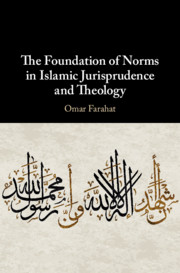(Source: Cambridge University Press)
Cambridge
University Press is publishing a new book on classical Islamic law.
ABOUT THE BOOK
In this book,
Omar Farahat presents a new way of understanding the work of classical Islamic
theologians and legal theorists who maintained that divine revelation is
necessary for the knowledge of the norms and values of human actions. Through a
reconstruction of classical Ashʿarī-Muʿtazilī debates on the nature and
implications of divine speech, Farahat argues that the Ashʿarī attachment to
revelation was not a purely traditionalist position. Rather, it was a rational
philosophical commitment emerging from debates in epistemology and theology. He
further argues that the particularity of this model makes its distinctive
features helpful for contemporary scholars who defend a form of divine command
theory. Farahat's volume thus constitutes a new reading of the issue of reason
and revelation in Islam and breaks new ground in Islamic theology, law and
ethics.
ABOUT THE AUTHOR
Omar Farahat,
McGill University, Montréal
Omar Farahat is
Assistant Professor of Law at McGill University, Montreal.
TABLE OF CONTENTS
Introduction: classical Islamic thought and
the promise of post-secularism
Part I. Epistemological and Metaphysical Foundations:
1. What do we know without revelation? The epistemology of divine speech
2. God in relation to us: the metaphysics of divine speech
3. The nature of divine speech in classical theology
Part II. The Construction of Norms in Islamic Jurisprudence:
4. The nature of divine commands in classical legal theory
5. Divine commands in the imperative mood
6. The persistence of natural law in Islamic jurisprudence.
Part I. Epistemological and Metaphysical Foundations:
1. What do we know without revelation? The epistemology of divine speech
2. God in relation to us: the metaphysics of divine speech
3. The nature of divine speech in classical theology
Part II. The Construction of Norms in Islamic Jurisprudence:
4. The nature of divine commands in classical legal theory
5. Divine commands in the imperative mood
6. The persistence of natural law in Islamic jurisprudence.
More information here


No comments:
Post a Comment
Note: Only a member of this blog may post a comment.